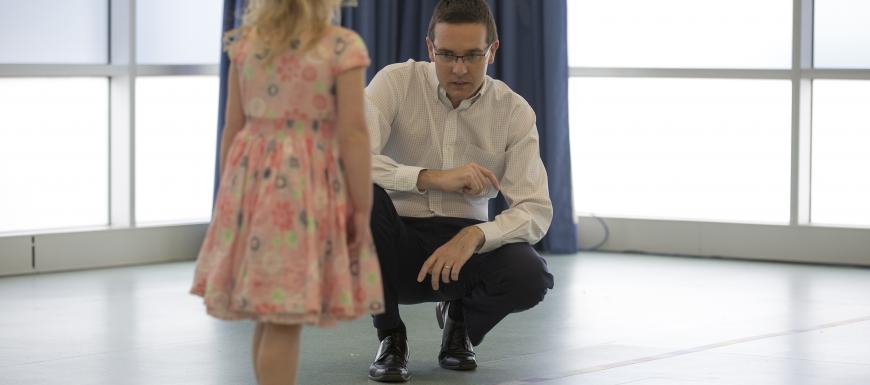World-first guidelines for children with common inherited nerve disorder
Paediatric neurologists and allied health clinicians have developed world-first clinical practice guidelines for children with Charcot-Marie-Tooth disease (CMT), the most common childhood inherited nerve disorder.

This international effort was led by Professor Joshua Burns at Sydney Children’s Hospitals Network (SCHN), including Kids Neuroscience Centre, Kids Research, and University of Sydney (USyd), and Dr Eppie Yiu at Murdoch Children’s Research Institute (MCRI), and involved Dr Paula Bray, SCHN Director of Research, Dr Manoj Menezes, SCHN and USyd, and Associate Professor Michelle Farrar, SCHN and UNSW. Kids Research photo
Bridie Byrne, Murdoch Children’s Research Institute 3 March 2022
Murdoch Children’s Research Institute (MCRI) research associate Dr Eppie Yiu and University of Sydney Professor Joshua Burns led an international effort to produce the guidelines, which address the management of common clinical problems experienced by children with CMT and related neuropathies (weakness, numbness and pain from nerve damage), and advocates for improved access to multidisciplinary care.
CMT is a lifelong degenerative condition that causes damage to the nerves, muscle weakness, sensory problems, difficulty walking, foot deformity and associated pain, which usually start during childhood and progress over time. Although there is currently no cure, people with CMT can use a variety of therapies and strategies to help manage their symptoms.
The disease is the most common inherited nerve disorder. Yet until now, there were no guidelines to help patients manage their condition. To address this need, Dr Yiu, Professor Burns and their team formed the Paediatric CMT Best Practice Guidelines Consortium, involving clinicians from Australia, Belgium, Canada, Croatia, US, Czech Republic, Italy and the United Kingdom.
“The aim was to develop evidence and consensus-based recommendations for the clinical management of children and adolescents with CMT,” Dr Yiu said.
Dr Yiu said the guidelines would promote optimal, standardised care for children with CMT globally, improve access to multidisciplinary care, such as via the National Disability Insurance Scheme (NDIS), and were critical for clinical trial readiness.
To develop the guidelines, the international panel of clinicians conducted a series of systematic reviews covering 10 clinical questions and evaluated the body of literature on CMT disease management. The panel then formulated recommendations based on these reviews.
The guidelines, published in the Journal of Neurology, Neurosurgery and Psychiatry, include evidence and consensus-based recommendations for the management of muscle weakness, balance and mobility impairment, sensory symptoms, muscle cramps, impaired upper limb function, respiratory impairment, joint movement and non-surgical management of joint deformity.
Dr Yiu said she hoped the recommendations would be disseminated and implemented across multiple healthcare settings around the world to benefit children and young people with CMT.
“The guidelines are important for a range of medical and allied health clinicians who provide care to children with CMT, including neurologists, rehabilitation specialists, physiotherapists, occupational therapists, clinical nurse specialists and genetic counsellors,” she said.
Clinicians from The Royal Children’s Hospital, University of Melbourne, Children’s Hospital at Westmead, Sydney Children’s Hospital Randwick, UNSW Sydney, Macquarie University and Concord Hospital, The Children’s Hospital of Philadelphia, University of Antwerp, Stanford and University of Pennsylvania also took part in the review.
| *The content of this communication is the sole responsibility of MCRI and does not reflect the views of the NHMRC. |
![]() Source Murdoch Children’s Research Institute via EurekAlert! AAAS
Source Murdoch Children’s Research Institute via EurekAlert! AAAS
| References |
Clinical practice guideline for the management of paediatric Charcot-Marie-Tooth disease, Yiu EM, Bray P, Baets J, Baker SK, Barisic N, de Valle K, Estilow T, Farrar MA, Finkel RS, Haberlová J, Kennedy RA, Moroni I, Nicholson GA, Ramchandren S, Reilly MM, Rose K, Shy ME, Siskind CE, Yum SW, Menezes MP, Ryan MM, Burns J. J Neurol Neurosurg Psychiatry. 2022 Feb 9:jnnp-2021-328483. doi: 10.1136/jnnp-2021-328483. Epub ahead of print.
| Further reading |
Emerging Therapies for Charcot-Marie-Tooth Inherited Neuropathies, Stavrou M, Sargiannidou I, Georgiou E, Kagiava A, Kleopa KA. Int J Mol Sci. 2021 Jun 3;22(11):6048. doi: 10.3390/ijms22116048. Full text
Targeted Therapies for Hereditary Peripheral Neuropathies: Systematic Review and Steps Towards a ‘treatabolome’, Jennings MJ, Lochmüller A, Atalaia A, Horvath R. J Neuromuscul Dis. 2021;8(3):383-400. doi: 10.3233/JND-200546. Full text
Axonal Charcot-Marie-Tooth Disease: from Common Pathogenic Mechanisms to Emerging Treatment Opportunities. Neurotherapeutics, McCray BA, Scherer SS. 2021 Oct;18(4):2269-2285. doi: 10.1007/s13311-021-01099-2. Epub 2021 Oct 4.
Neuropathy-causing TRPV4 mutations disrupt TRPV4-RhoA interactions and impair neurite extension, McCray BA, Diehl E, Sullivan JM, Aisenberg WH, Zaccor NW, Lau AR, Rich DJ, Goretzki B, Hellmich UA, Lloyd TE, Sumner CJ. Nat Commun. 2021 Mar 4;12(1):1444. doi: 10.1038/s41467-021-21699-y. Full text. PDF
Falls in paediatric Charcot-Marie-Tooth disease: a 6-month prospective cohort study, Kennedy RA, Carroll K, Hepworth G, Paterson KL, Ryan MM, McGinley JL. Arch Dis Child. 2019 Jun;104(6):535-540. doi: 10.1136/archdischild-2018-314890. Epub 2018 Aug 13.
Ascorbic acid for Charcot-Marie-Tooth disease type 1A in children: a randomised, double-blind, placebo-controlled, safety and efficacy trial, Burns J, Ouvrier RA, Yiu EM, Joseph PD, Kornberg AJ, Fahey MC, Ryan MM. Lancet Neurol. 2009 Jun;8(6):537-44. doi: 10.1016/S1474-4422(09)70108-5. Epub 2009 May 6.
Also see
Consumer Health: What is Charcot-Marie-Tooth disease? Mayo Clinic
Landmark guidelines for children with Charcot-Marie-Tooth disease Kids Research
Gene2Care: Improving the patient journey for children with rare genetic diseases Kids Research
Clinical practice guideline for the care of children with Charcot-Marie-Tooth disease Murdoch Children’s Research Institute
Rare Diseases Clinical Research Network Cincinnati Children’s Hospital Medical Center
